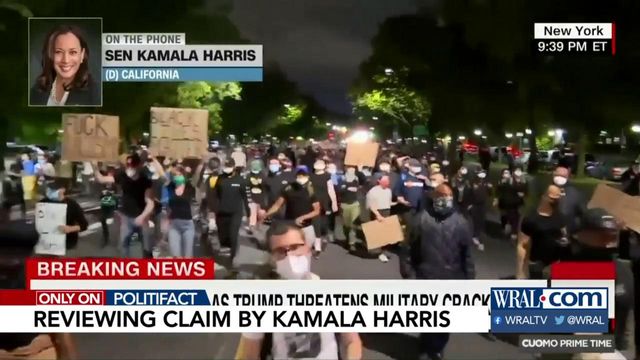Fact check: Kamala Harris' claim about Donald Trump and investigations of police misconduct
Sen. Kamala Harris claimed that President Donald Trump has undermined Obama administration efforts to investigate and to hold law enforcement agencies accountable for discrimination.
During her June 1 interview with CNN’s Chris Cuomo, the Democrat and former California attorney general spoke about George Floyd, a 46-year-old black man who died in Minneapolis police custody after a white police officer pressed his knee on Floyd’s neck for nearly nine minutes. Floyd’s May 25 death has prompted thousands of people to protest daily across the nation. They say they want justice for Floyd and an end to police brutality.
As part of that process, Harris said, the United States needs to continue the police oversight done by former President Barack Obama and his administration, such as pattern-or-practice investigations of police departments.
"Donald Trump came in with Jeff Sessions and undid those," Harris said. "Barack Obama and his administration did do the work of enforcing consent decrees on police departments that had been found to engage in misconduct. Donald Trump came in and undid those."
Is it accurate that the Trump administration "undid" investigations of police departments and consent decrees, as Harris claimed? We found the assessment to be largely on point: Such investigations have not ceased altogether, but they have declined and are disfavored by the Trump administration.
A spokesman for Harris said the senator wasn’t saying that investigations or consent decrees were banned, but that they had diminished under Trump.
What are pattern-or-practice investigations?
Congress in 1994 gave the U.S. attorney general the authority to investigate and litigate cases of police patterns or practices that violate constitutional or federal rights. This happened after a video of the 1991 beating of Rodney King by Los Angeles police officers fueled public outrage and the subsequent 1992 riots and protests over police officers acquitted on state criminal charges.
The U.S. Justice Department’s Civil Rights Division performs the investigations to ensure that police departments are policing lawfully and fairly.
These types of investigations don’t center on one single incident. They examine broader behavior to determine whether there’s misconduct within a department. Investigations may examine whether a police department has a pattern or practice of stops, searches, or arrests that violate the Fourth Amendment; use of excessive force; discriminatory policing; and violation of criminal suspects’ constitutional rights.
The Justice Department under Obama opened 25 investigations into law enforcement agencies.
A high-profile investigation involved the police department in Ferguson, Mo., the St. Louis suburb where 18-year-old Michael Brown was fatally shot by a white police officer in August 2014. The Justice Department identified a pattern or practice of unlawful stops and arrests; violations of the right to observe and record police activity; excessive force; and discriminatory policing. As a result, the city of Ferguson and the Justice Department entered into a court-enforced consent decree, a negotiated agreement overseen by an independent monitor that details specific remedies the department had to implement.
PolitiFact asked the Justice Department for the number of police pattern-or-practice investigations opened by the Trump administration. We did not get a response. We reviewed press releases issued by the Justice Department since 2017 and did not find announcements of investigations initiated by the Trump administration. But we found April 2018 news reporting and a statement from the city of Springfield, Mass., about a new federal investigation into the narcotics unit of its police department, to examine whether the unit engaged in a pattern or practice of using excessive force.
"The DOJ since Trump’s election has largely stopped conducting formal investigations, issuing findings letters, or negotiating consent decrees (or memorandums of understanding) related to local police misconduct," said Stephen Rushin, an associate professor at Loyola University Chicago School of Law. The Springfield investigation "appears to be an outlier," he said.
The U.S. Commission on Civil Rights found in November 2019 that enforcement actions against law enforcement agencies decreased from eight resolved cases in fiscal year 2016 to three in 2018.
Trump’s first attorney general, Jeff Sessions, told U.S. attorneys and department leaders in March 2017 that it was not the federal government’s responsibility to manage non-federal law enforcement.
"The misdeeds of individual bad actors should not impugn or undermine the legitimate and honorable work that law enforcement officers and agencies perform in keeping American communities safe," Sessions said in a memo. He ordered a review of all department activities, including investigations and existing or draft consent decrees.
At his Senate confirmation hearing and throughout his tenure as attorney general, Sessions argued that consent decrees got in the way of day-to-day operations of police departments and that their provisions could hurt police and make cities less safe.
"We will not sign consent decrees for political expediency that will cost more lives by handcuffing the police instead of the criminals," Sessions said in an April 2017 USA Today op-ed.
Criminal-justice experts told PolitiFact that the Justice Department under Trump tried to retreat from consent decrees negotiated before Trump took office, including one with the Baltimore Police Department after investigators determined that the department engaged in a pattern of discriminatory and unconstitutional policing.
Trump administration attorneys general "have made it clear" that the Justice Department wants no new consent decrees "and does not support any efforts that would ‘undermine’ or ‘interfere with’ police departments," said David A. Harris, a Sally Ann Semenko Endowed Chair and law professor at the University of Pittsburgh.
Our ruling

Harris said the Obama administration did pattern-or-practice investigations of discrimination by police departments and "Donald Trump came in with Jeff Sessions and undid those."
Pattern-or-practice investigations into police departments were supported by the Obama administration and disfavored by the Trump administration. Obama’s administration initiated at least 25 investigations into law enforcement agencies. The Justice Department did not tell PolitiFact how many investigations it’s initiated under Trump, but our review of publicly available information showed there may have been one.
Harris’ statement is accurate but needs clarification, we rate it Mostly True.











